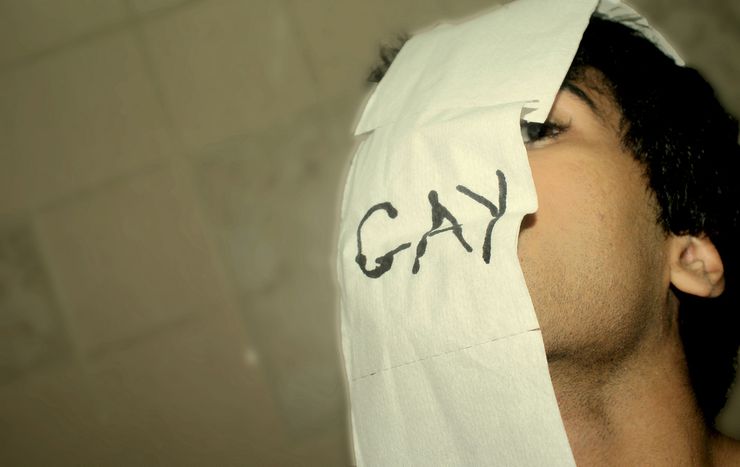
GAY RIGHTS IN LITHUANIA: ONE STEP FORWARD, TWO STEPS BACK (PART 2)
Published on
Translation by:
Gilhean SlaterThe second part of Judith Sinnige's report on homophobia in Lithuania
In a country where 80% of the population is Catholic, the Church has a considerable influence over the lives of homosexuals in Lithuania. 'Last year on two occasions the Church called for faculties of medicine to stop teaching about IVF treatment and abortion,' Marija Pavilionienė tells us, a lecturer and a feminist. Furthermore, representatives from the Church can regularly be found in Parliamentary tribunals where they meddle in ethical discussions. 'During the 2008 elections some churches stuck posters on their walls of ‘black listed’ candidates who must not be voted for. My name was on that list,' adds Pavilionienė. 'It’s completely illegal. It’s a country where there is supposed to be a separation between the Church and the State!'
the principle of non discrimination
The media don’t exactly help the situation. Almost all newspapers are openly anti-gay. 'They mock homosexuality and speak about it in a vulgar way,' says Pavilionienė. 'They do it to attract readers.' Journalist Mindaugas Jackevičius confirms this attitude on his news site Delfi. 'Generally the way the media speak about homosexuality is based on stereotypes and the imaginary threat it poses such as being a danger to traditional family values.' Also, ‘Gražulis' jeans’ (please refer to the first part of our report) were greatly appreciated by the Lithuanian media. Delfi was the only news site to condemn his actions, describing GražulisGražulisGražulisGražulisGražulisGražulisvvGražulis as 'an embarrassment to Lithuania', Jackevičius tells us. Simonko reminds us that, 'Lithuania is close to Russia where there is real hysteria towards homosexuality. In Lithuania we also pick up several Russian TV channels, many people understand Russian here, so we don’t hear many positive perspectives on homosexuality,' he explains.
 What can Europe do for Lithuania, one of its member states since 2004? The principal of non-discrimination is an important element of European legislation. The Treaty of the European Union as well as the Charter of Fundamental Rights of the European Union reject discrimination on the base of sexual orientation. Despite this, the rights of homosexuals do not seem to be moving in the right direction. In this context, militant Juris Lavrikovs believes that the EU is 'blind' to homophobia Lithuania. In a column published in EUobserver, he claims that the EU does not have the legal instruments to reprimand a country violating these rights, nor a realistic strategy for Member States even though such a strategy exists for the founding countries. Simonko also regrets the situation: 'Two years ago I did an interview with Viviane Reding (European Commissioner for Justice, Europan Rights and Citizenship). She promised to keep a close eye on the situation in Lithuania, but hasn't take any action.' Ahead of the Eastern Partnership Summit, held at the end of November in Vilnius, the EU, under the Lithuanian Presidency, put pressure on Ukraine to combat the discrimination against homosexuals, yet the situation in Lithuania is hardly any better.
What can Europe do for Lithuania, one of its member states since 2004? The principal of non-discrimination is an important element of European legislation. The Treaty of the European Union as well as the Charter of Fundamental Rights of the European Union reject discrimination on the base of sexual orientation. Despite this, the rights of homosexuals do not seem to be moving in the right direction. In this context, militant Juris Lavrikovs believes that the EU is 'blind' to homophobia Lithuania. In a column published in EUobserver, he claims that the EU does not have the legal instruments to reprimand a country violating these rights, nor a realistic strategy for Member States even though such a strategy exists for the founding countries. Simonko also regrets the situation: 'Two years ago I did an interview with Viviane Reding (European Commissioner for Justice, Europan Rights and Citizenship). She promised to keep a close eye on the situation in Lithuania, but hasn't take any action.' Ahead of the Eastern Partnership Summit, held at the end of November in Vilnius, the EU, under the Lithuanian Presidency, put pressure on Ukraine to combat the discrimination against homosexuals, yet the situation in Lithuania is hardly any better.
lithuania's attitude is hypocrytical
 It was only in October 2013 that the Lithuanian Government stopped opposing the anti-discrimination directive put in place by the EU in 2008 to complement the existing legislation. For the past 3 years Lithuania has opposed this legislation but when it took on the EU Presidency, it was difficult for it to maintain its opposition. 'It’s hypocritical,' says Simonko. So what does Gražulis have to say about all this ? He thinks that the EU is to blame for 'dictating homosexuality to us' and for, 'stealing the souls of our people. The EU will end up collapsing because of it, it’s just a matter of time.'
It was only in October 2013 that the Lithuanian Government stopped opposing the anti-discrimination directive put in place by the EU in 2008 to complement the existing legislation. For the past 3 years Lithuania has opposed this legislation but when it took on the EU Presidency, it was difficult for it to maintain its opposition. 'It’s hypocritical,' says Simonko. So what does Gražulis have to say about all this ? He thinks that the EU is to blame for 'dictating homosexuality to us' and for, 'stealing the souls of our people. The EU will end up collapsing because of it, it’s just a matter of time.'
read the first part of our report here.
Tous propos recueillis par Judith Sinnige
Translated from Les Gays en lituanie : « un pas en avant, deux en arrière » (partie 2)



